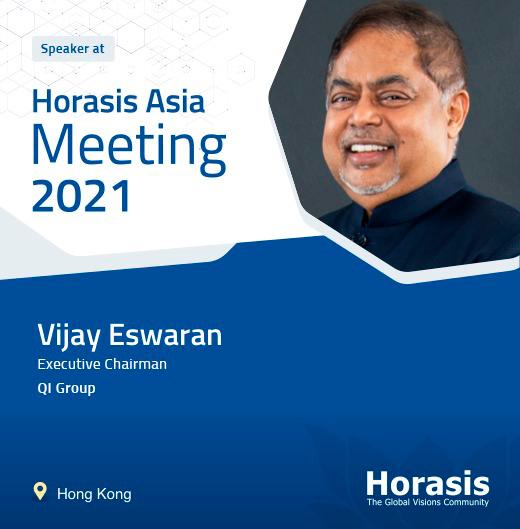PETALING JAYA: The global economy is expected to shift from the west to the east post-pandemic and the future is going to be the Asian Millennium.
“The driving forces in Asia are India, China, Asean and also the Far East – Japan, Taiwan and South Korea. These are regional hubs, which are fundamentally important. I think we should give more importance to our backyard and Asia needs to develop its own philosophy to deal with the challenges moving forward,” prominent Malaysian entrepreneur Datuk Seri Vijay Eswaran said in his address at the annual Horasis Asia Meeting, Asia’s premier gathering of the region’s most senior leaders from business and government.
Held on Horasis‘ ground-breaking digital conferencing platform on Friday, the event brought together over 400 of the foremost business and political leaders from across Asia and the world to discuss ways to overcome the profound economic, political and social disruptions caused by Covid-19.
Speaking on the topic, Shaping the New Asia, Vijay, the Executive Chairman of Asian conglomerate, the QI Group, said it is going to be a real challenge shaping global economies, adding that everyone is walking into a new norm, post-pandemic. Collaboration, connectivity and Covid-19 recovery were some of the key themes of his address.
He called for an Asian economic integration, stressing that Asia needs to develop as a trade bloc which will be a formidable powerhouse. He pointed out that half of the world’s population lives in Asia, where economies are growing quickly and becoming increasingly interconnected in culture, business, and trade.
A new mega trade bloc, he said, has the potential to help fuel investment in the wake of the Covid-19 crisis and provide a framework for further regional cooperation at a time of global trade tensions.
“I think what China has done with the Belt and Road Initiative (BRI) is a very powerful move in bringing together economies across the third world, and particularly in Asean, this has been noticed and welcomed,” Vijay said.
“This has pivoted China’s impact on the world and developed new investment opportunities, cultivated export markets, and boosted Chinese income and domestic consumption, ultimately leading them to become today’s economic powerhouse.
“We have to recognise that Asia is going to be leading or at least taking up half of world GDP by 2040 and this is a critically an important development,” Vijay added, acknowledging a research report from McKinsey.
Touching on Small and Medium Enterprises (SMEs), he pointed out that SMEs are going to be the future, post pandemic. He stressed that the economic health of a nation is heavily dependent on the revival of the small and medium businesses, hence they require the most amount of protection, and financial credit schemes to keep them afloat coming out of the pandemic.
“The SMEs are the real power of the future. It is the SMEs that took the biggest hit during the pandemic and it’s the SMEs that are going to re-build. No doubt the big boys are important in bringing investments, FDIs to the various countries across Asia but we need to focus on the SMEs because the SMEs are the engines of growth and they need to basically revive, renew and re-empower themselves,” he said.
Vijay also touched on the importance of promoting entrepreneurship highlighting that the pandemic has given rise to an explosion of new entrepreneurs who are taking advantage of consumer acceptance of the digital economy.
Other panelists at the session included Oki Matsumoto, Chairman, Monex Group from Japan, Herbert Chen Wu, Managing Director of The Economist Global Business Review in China, and Neeraj Kulshrestha, the Chief Regulatory Officer of the Bombay Stock Exchange in India. The panel was chaired by Pranjal Sharma, Contributing Editor, Business Standard, India.
Vijay Eswaran was also the Co-Chair of the Horasis Asia Meeting 2021.
The QI Group has been an active member of Horasis, an international Think Tank since 2016. Over the course of the Horasis Asia Meeting 2021, discussions focused on rebooting economic activity, how jobs in the region will look going forward, and how more sustainable development can occur in Asia in a post-coronavirus world.














